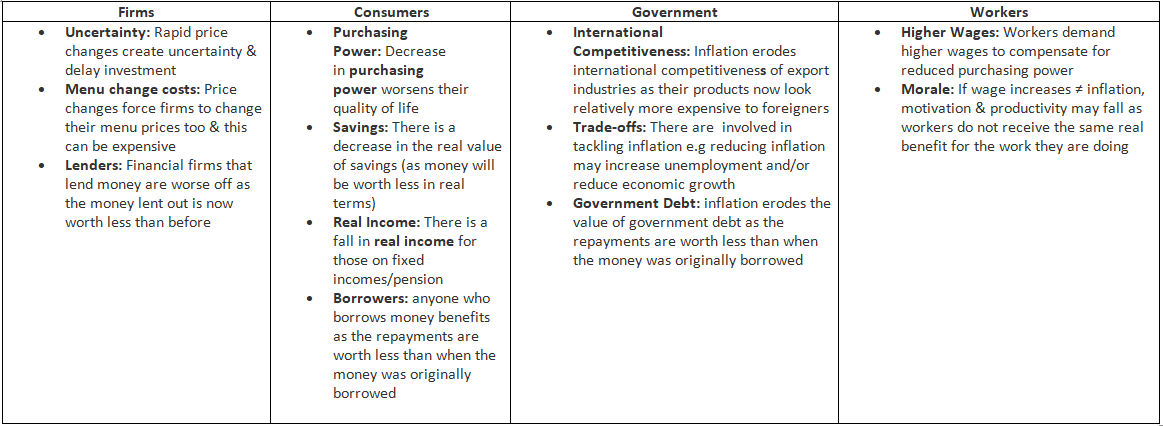Year 11 Exam > Year 11 Notes > Economics for GCSE/IGCSE > Causes & Consequences of Inflation
Causes & Consequences of Inflation | Economics for GCSE/IGCSE - Year 11 PDF Download
The Causes of Inflation
- Rises in the overall price level in an economy can result from either demand-pull inflation or cost-push inflation.
Demand Pull Inflation
- Demand-pull inflation arises from an excess of demand within the economy.
- Total (aggregate) demand comprises the total expenditure in the economy.
- rGDP = Consumption (C) + Investment (I) + Government spending (G) + Net Exports (X-M)
- If any of the four components of rGDP experience an increase, it will result in a rise in total demand within the economy, thereby leading to an increase in the general price level.
- This situation indicates the occurrence of demand-pull inflation.
An Example of Demand Pull Inflation:
A reduction in the base rate by the Central Bank typically stimulates increased borrowing by both firms and consumers.
- This, in turn, fosters heightened levels of consumption and investment, consequently boosting rGDP.
- Such a scenario is likely to precipitate a form of demand-pull inflation.
Cost Push Inflation
- Cost-push inflation results from rises in production costs within an economy.
- Any increase in production costs, such as labor or raw materials, or a decrease in productivity, will diminish total supply.
- A reduction in supply drives prices upward, resulting in an escalation of the general price level.
- This situation indicates the occurrence of cost-push inflation.
An Example of Cost Push Inflation:
- Trade Unions negotiate elevated wages for workers.
- These wage hikes constitute heightened production costs for firms.
- Consequently, firms curtail production due to increased inputs, resulting in diminished supply and elevated general price levels.
- This scenario indicates the emergence of cost-push inflation.
Question for Causes & Consequences of InflationTry yourself: What is the cause of demand-pull inflation?View Solution
The Consequences of Inflation
The Impact Of Inflation On Different Stakeholders

The document Causes & Consequences of Inflation | Economics for GCSE/IGCSE - Year 11 is a part of the Year 11 Course Economics for GCSE/IGCSE.
All you need of Year 11 at this link: Year 11
|
71 videos|82 docs|39 tests
|
FAQs on Causes & Consequences of Inflation - Economics for GCSE/IGCSE - Year 11
| 1. What are some common causes of inflation? |  |
Ans. Some common causes of inflation include an increase in demand for goods and services, rising production costs, expansionary monetary policies, and supply shocks.
| 2. How does inflation impact the economy? |  |
Ans. Inflation can lead to a decrease in purchasing power, higher interest rates, reduced savings, and can also create uncertainty in the economy, affecting investment and overall economic growth.
| 3. What are the consequences of high inflation rates? |  |
Ans. High inflation rates can lead to a decrease in the value of money, increased costs of living, reduced consumer spending, and can also erode the value of savings and investments.
| 4. How does inflation affect different sectors of the economy? |  |
Ans. Inflation can affect different sectors of the economy differently. For example, rising prices can impact industries that rely heavily on raw materials, while service-based sectors may experience increased costs of labor.
| 5. How can inflation be controlled or managed by policymakers? |  |
Ans. Policymakers can control inflation by implementing tight monetary policies, such as increasing interest rates, reducing government spending, and regulating the money supply to help stabilize prices and prevent excessive inflation.
Related Searches

















